How 2 Engineers From India Built ‘EV Doctor’ — A Game-Changer for EV Batteries
Back in 2020 summer, during an electric vehicle workshop in Gujarat’s Gandhinagar, a technician was not only doing something dangerous, but it was his routine to do it that way. What was he doing, though? Shubham Mishra, co-founder of BatteryOk Technologies, recalls, “He was inspecting an e-bike battery, not with any specialised tool or equipment, but with his bare hands. The battery was extremely hot, and the technician was using rudimentary methods to judge its condition, without caring about his safety.”
Following this observation, Shubham shares, “That was the moment that set me on the path I am on today. It was not just about building a portable battery diagnostic device, but finding a solution people can trust.”
That unsettling observation eventually gave birth to ‘EV Doctor’, an advanced, AI-powered battery diagnostic tool that has gained massive attention in the Indian and global EV ecosystem. But the story of this entrepreneurial journey for Shubham did not begin in a lab. It started in a car park.
Before the incident in Gandhinagar, the 30-year-old was working as a design engineer at Gensol Engineering Private Limited, the parent company of BluSmart Mobility. Every day, as he walked through the company’s parking area, he noticed an increasing number of electric two-wheelers lined up. This always inspired him to start a business in the field.
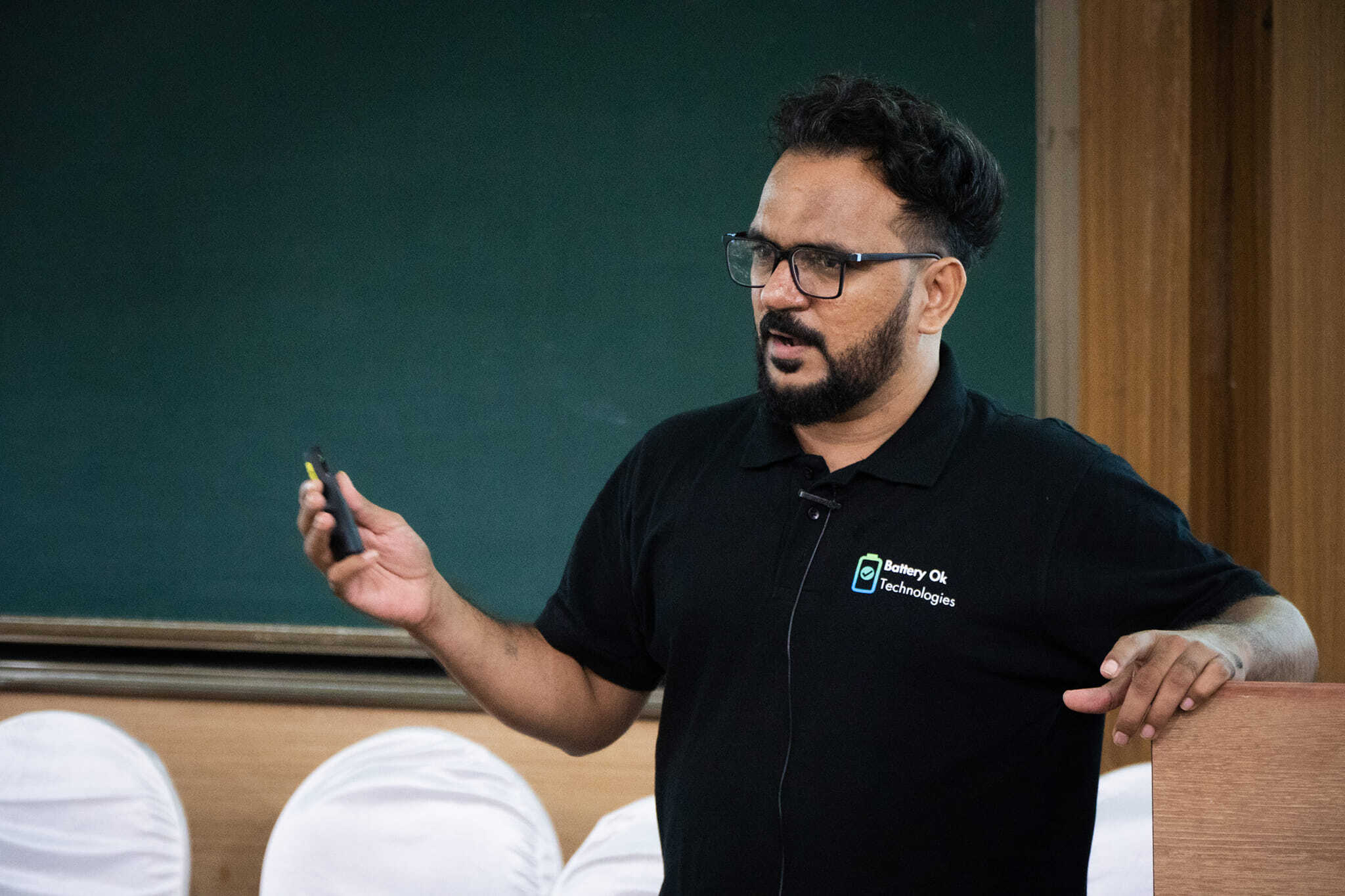 Shubham Mishra wanted to build a portable EV battery testing device to help the dealers
Shubham Mishra wanted to build a portable EV battery testing device to help the dealers
With a master of Technology (MTech) in Energy Infrastructure from the Institute of Infrastructure, Technology, Research and Management (IITRAM), and an executive education programme from the Indian Institute of Management Ahmedabad (IIM-A) under his belt, he had the academic background to understand energy systems. But it was his day-to-day experiences that gave him the drive to do something different.
“I used to look at those e-bikes and think, what if we could make this accessible to everyone? What if we could make EVs affordable for all?” he ponders.
Startup struggles and pandemic pause
In 2019, driven by this vision, Shubham left his corporate job and, alongside Ajay Vashisht, a fellow engineer and problem-solver, launched E-Vega Mobility Labs, a startup dedicated to creating cost-effective e-bike components.
The venture received financial backing through a Rs 2 lakh grant from the Gujarat University Startup and Entrepreneurship Council under the Student Startup and Innovation Policy (SSIP), as well as Rs 5 lakh from the National Initiative for Developing and Harnessing Innovations – Promoting and Accelerating Young and Aspiring Innovators & Startups (NIDHI-PRAYAS).
The startup gained early traction, but just as it was preparing to scale, the pandemic brought everything to a halt.
As the world went into lockdown, Shubham took the time to look deeper into the EV industry. The duo began meeting battery manufacturers and EV experts, first over Zoom calls, then later at exhibitions and conferences. That was when they began to understand the missing piece; batteries were the beating heart of EVs, yet the least understood and least trusted. The incident in Gandhinagar also prompted him to focus on the missing piece.
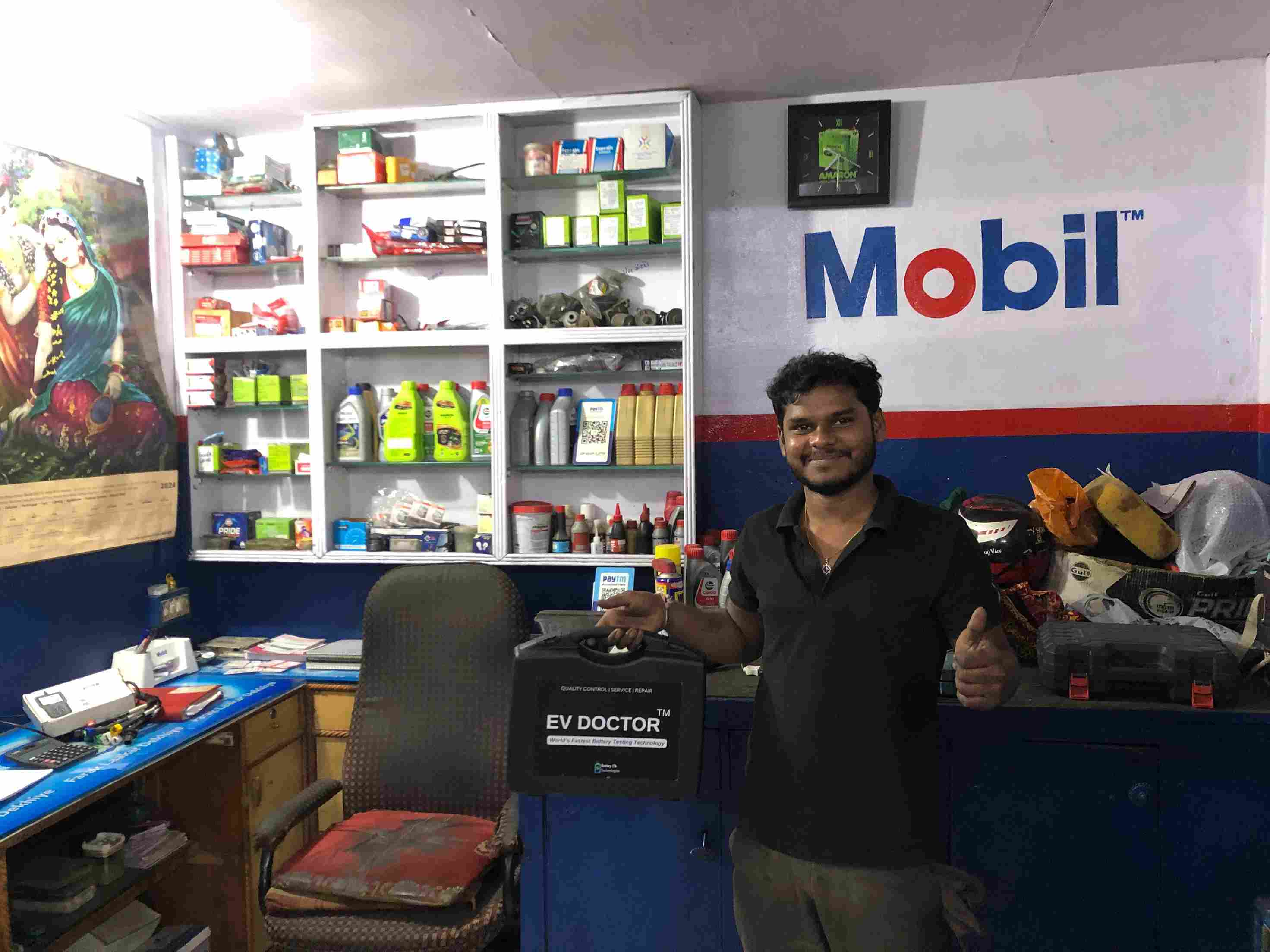 EV Doctor helps to check the health and performance of the batteries within 15 minutes
EV Doctor helps to check the health and performance of the batteries within 15 minutes
Ajay, who holds a master of Technology (MTech) in Instrumentation and Control from Nirma University, was working as a Project Engineer at the Defence Research and Development Organisation (DRDO) when he left that and joined the e-bike venture.
With a strong background in high-precision systems and a deep fascination for energy storage, he proved to be the perfect partner for the ambitious journey ahead.
“I was not just intrigued by batteries. I was obsessed with the time gap between testing and diagnosis. Existing battery testing methods were slow, clunky, and offered very little insight. I believed we could compress hours of testing into minutes, and make the results comprehensive,” explains Ajay.
Two engineers fixing the EV puzzle
Together, they began working on a tool that can analyse battery health faster, more accurately, and without the need for expensive and imported machinery. What followed was a year of intense research and development, from reading through research papers and patents to building prototypes with open-source kits. They consulted with battery experts, attended international conferences, and conducted experiments in university labs.
In mid-2021, the duo launched BatteryOk Technologies. And on 15 August 2022, they officially introduced EV Doctor to the world.
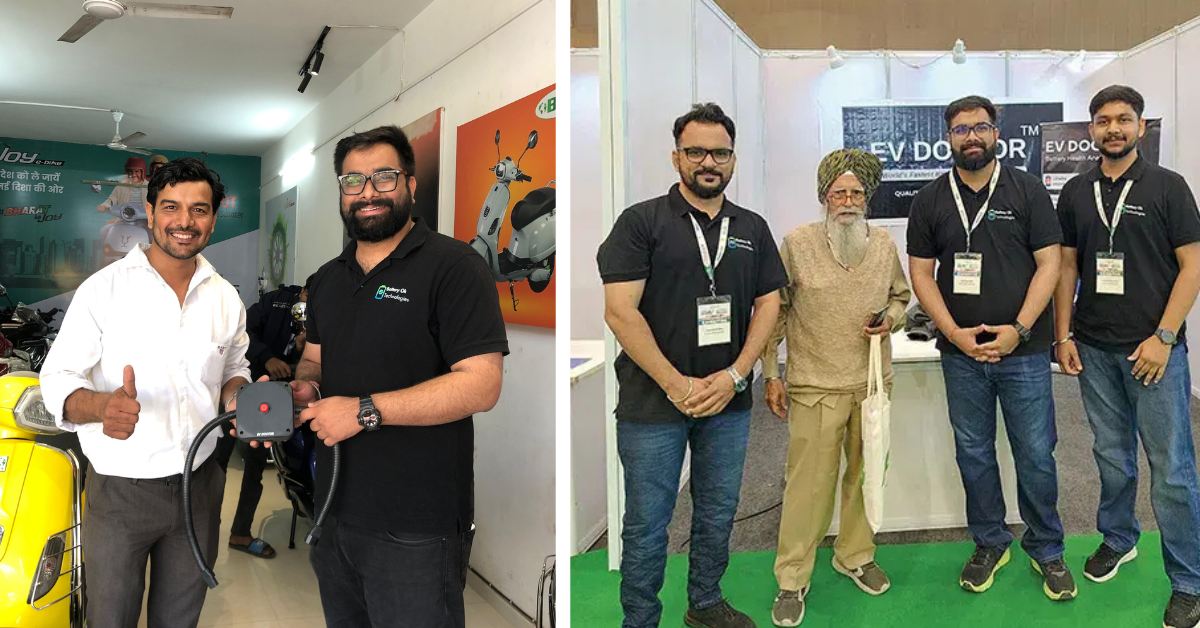 The EV Doctor is used in more than 1,700 EV workshops and service centres across India, South Korea, Vietnam, Mexico, Mauritius, and the United States
The EV Doctor is used in more than 1,700 EV workshops and service centres across India, South Korea, Vietnam, Mexico, Mauritius, and the United States
At first glance, EV Doctor appeared to be a simple device. But inside its 300-gram frame lies a powerful system built around artificial intelligence and years of battery-specific research.
“Traditional battery testing relies heavily on charge-discharge cyclers, or CDC machines, which are bulky systems that take seven to eight hours to provide basic statistics like voltage and capacity. These metrics alone are insufficient for diagnosing deeper battery issues such as internal resistance or early-stage safety faults,” explains Shubham.
EV Doctor changed the game. Instead of taking hours to test a battery like traditional machines, it uses smart technology to check everything in just 15 minutes. It looks at how the battery behaves when electricity flows through it and uses over 25 artificial intelligence (AI) models to understand its overall health, safety, performance, and faults.
The device works with all kinds of batteries, whether they use advanced communication systems like Controller Area Network (CAN) or not, and can test batteries up to 100 volts and 100 ampere-hours in size.
Battery tests that take minutes
“All a user has to do is connect the device to a battery and charger. It then transmits real-time data – like voltage, current, and time, to cloud-based algorithms that compute safety parameters, fault detection, and capacity degradation. The results are sent back to a mobile app with a complete report on the battery’s health, safety, performance, and faults,” he says.
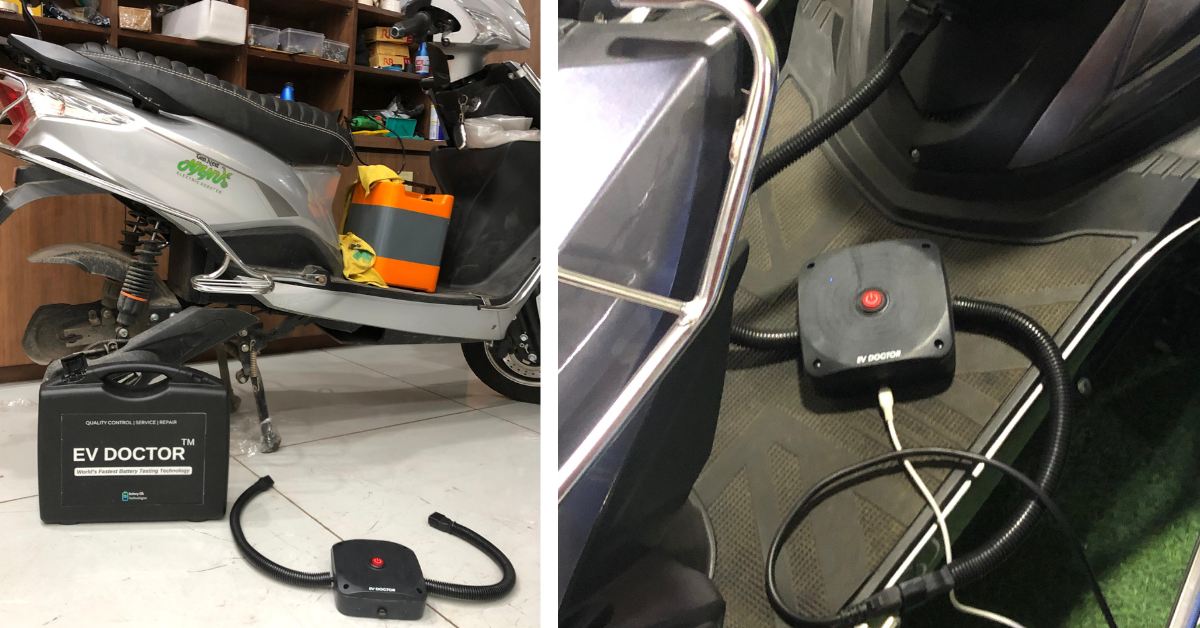 The EV Doctor device has been tested on over five lakh batteries so far
The EV Doctor device has been tested on over five lakh batteries so far
The co-founders claim that the results have an accuracy of over 96.7 percent.
“We have tested it on over five lakh batteries so far, and it has helped prevent serious issues, including potential fire hazards, in countless cases,” explains Ajay.
In its first year, BatteryOk sold just 20 units of EV Doctor. But as word spread, the numbers climbed.
In 2023, they sold 150 units. In 2024, that number reached 500. By April 2025, they have sold 600 units, bringing their total to over 1,500 devices sold worldwide. With a manufacturing capacity exceeding 1,000 units per month, the company is expanding rapidly.
Today, EV Doctor is used in more than 1,700 EV workshops and service centres across India, South Korea, Vietnam, Mexico, Mauritius, and the United States. Their client list includes industry leaders such as MG Motors, Zypp Electric, Yulu, White Carbon, Jitendra EV, and JioBP.
“For someone running an EV workshop, this device has been helpful,” says Pawan Prajapat (34), owner of Udaipur Ewheels, who purchased the EV Doctor in March 2024.
“Earlier, I could barely manage to test two or three batteries a day. Now, I test about 10 to 15 without breaking a sweat. The process is smooth, fast, and, most importantly, it gives me detailed insights without even having to open the battery pack. That, to me, is the biggest relief. I know what’s going on inside the battery just by plugging it in,” he explains.
“It’s like a full body check-up, but for batteries. It does not just show if something is wrong, it gives clarity on health, safety, and potential risks. That allows us to take preventive steps before anything serious happens. By using EV Doctor, I have tested hundreds of batteries, and not a single one has led to thermal issues. That alone has probably saved us lakhs in potential damage,” the workshop owner adds.
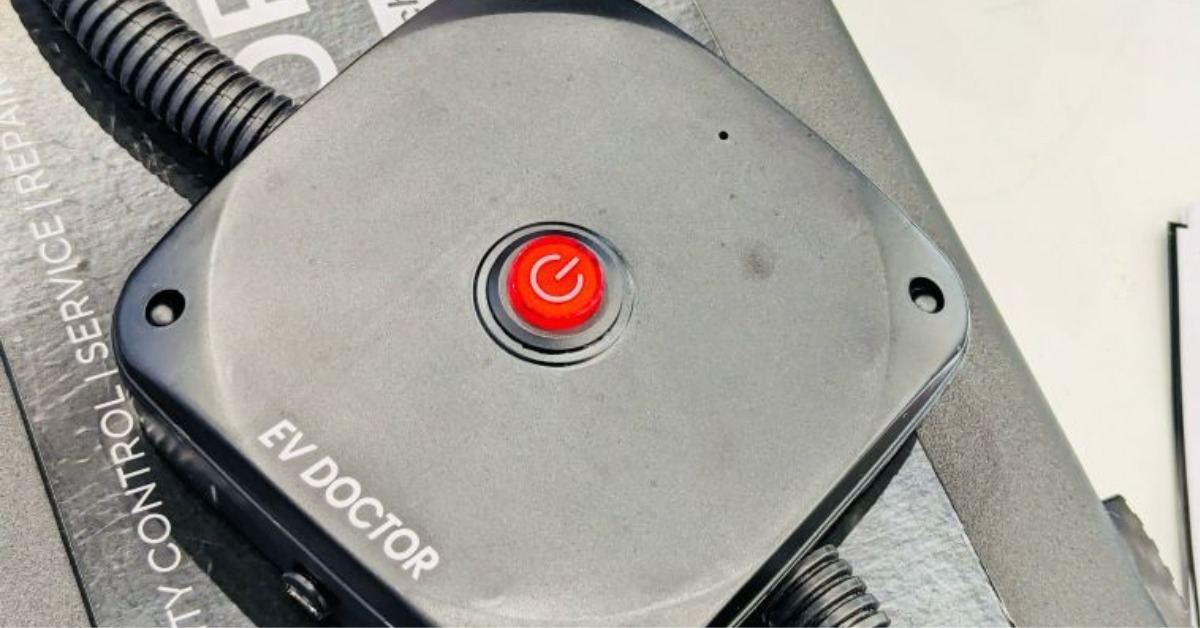 The duo has sold 600 units of the EV Doctor so far in 2025
The duo has sold 600 units of the EV Doctor so far in 2025
When asked about the cost of the device, he answers candidly, “To be honest, the pricing feels just right for what it offers. For workshop owners like me, battery health and safety are top priorities. And with this, I can sleep easily. I have even recommended it to nearby showroom owners.
While a few have already picked it up after seeing it in action here, others keep dropping by to get their batteries tested at our place. It is slowly becoming a standard, and that is a good thing for all of us.”
High-tech without the high price tag
Originally priced at Rs 25,000, the device is now available to garages and smaller service centres for as little as Rs 10,000, due to a redesigned business model focused on accessibility. The kit includes the EV Doctor device, power supply, extra connectors, a detailed user manual, two years of warranty, and lifetime upgrades, all aimed at democratising battery diagnostics.
What sets the device apart isn’t just its speed; it is also the science behind its safety. Working with the Indian Institute of Technology Gandhinagar (IIT-GN), the team conducted over 60 thermal runaway tests to make sure the device can reliably detect potential fire hazards in battery cells. These tests also informed the device’s safety prediction algorithms, which continue to evolve with every battery scanned.
“We consciously reduced the size from 1 kilogram to 300 grams to make it portable,” Ajay says. “But the real innovation is in how much it can do in so little time, compared to the existing devices. It can help EV owners get a better understanding of all the aspects of the battery.”
The company has calibrated the device against international benchmarks such as the International Electrotechnical Commission (IEC) and Underwriters Laboratories (UL) standards, guaranteeing it meets global expectations. It is now part of the curriculum at IIT-GN, where students learn battery safety and diagnostics using the device in hands-on lab sessions.
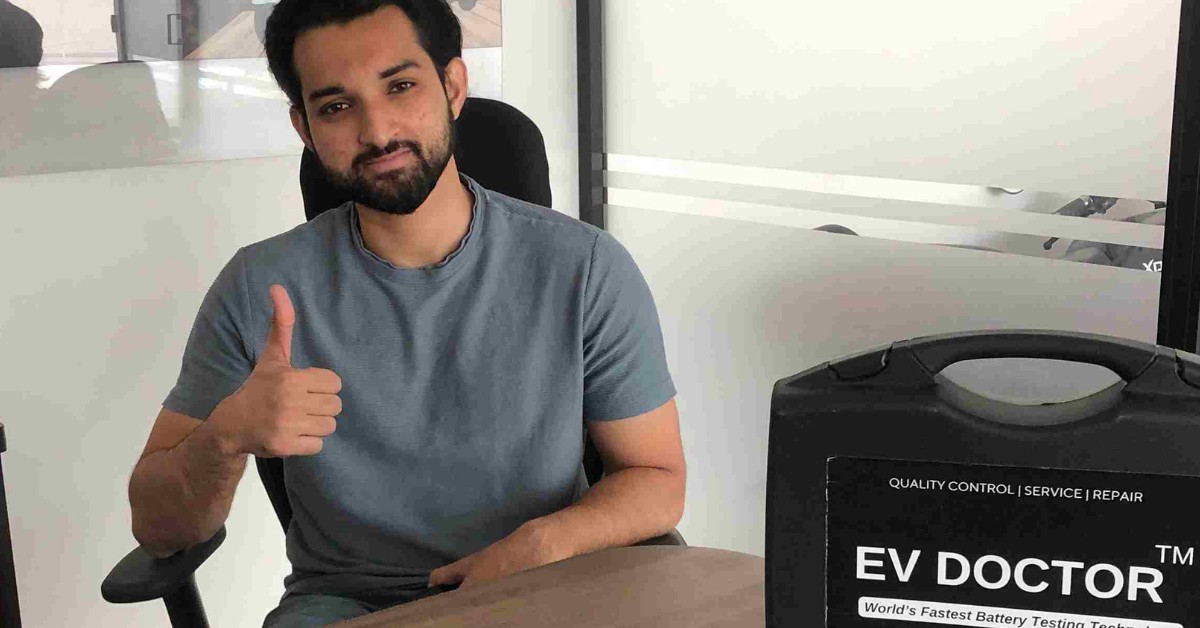 The client list for the EV Doctor includes MG Motors, Zypp Electric, Yulu, White Carbon, and Jitendra EV
The client list for the EV Doctor includes MG Motors, Zypp Electric, Yulu, White Carbon, and Jitendra EV
BatteryOk Technologies also receives mentorship from some of the sharpest minds in the field. Their advisory board includes Dr Judith Jeevarajan, former battery safety head at the National Aeronautics and Space Administration (NASA), and Kashi Vishwanathan, who is associated with Tesla, India.
They also receive strategic guidance from Naukri founder Sanjeev Bikhchandani and Zoho founder Sridhar Vembu, whom they reached out to through cold emails and LinkedIn.
Guided by experts to prevent hazards
BatteryOk Technologies collaborated with one of the industry experts during the development of EV Doctor – Sameer Jindal, Director at MG Motor India, and a veteran with over 25 years in the automotive sector. His involvement brought technical insight and a strong industry perspective to the project.
“With over two decades in the automotive industry, I have developed a real fascination for innovations in battery technology,” says Sameer. “That is what drew me to the EV Doctor team through our flagship initiative, the MG Motors Developer Program. My background in vehicle efficiency management allowed me to help benchmark the device against global standards right from the early stages,” he adds.
His role focused particularly on data acquisition systems and ensuring the device met the evolving demands of the EV ecosystem. “Our team worked closely on designing and refining how the device collects and interprets data, while the EV Doctor team constantly updated the AI models based on our input and user feedback,” he explains.
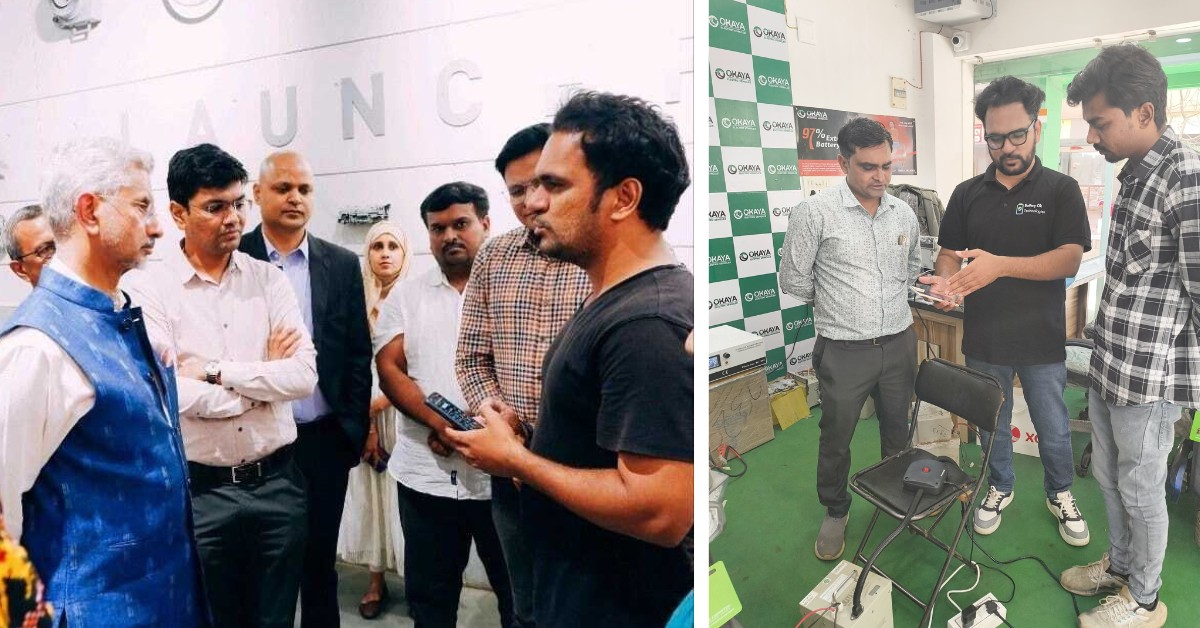 Shubham conducts demonstrations of the EV Doctor for dealers so they know the benefits
Shubham conducts demonstrations of the EV Doctor for dealers so they know the benefits
A major priority, he adds, was thermal runaway, the phenomenon where a battery overheats and potentially catches fire. “The EV Doctor team had done extensive testing in this area, which allowed us to train the AI models with real-world data. It gave the device a strong edge over other solutions in terms of risk prediction,” he adds.
Despite their success, the co-founders consider EV Doctor just the beginning. Their next project, under the umbrella of Energy AI Labs, is to build a universal operating system for batteries, essentially giving ‘a brain to every battery on Earth.’ This platform will allow continuous diagnostics, live updates, and predictive insights that can one day power everything from electric scooters to grid-scale storage.
‘Proper testing can extend a battery’s life by eight to 10 years’
“We are moving towards a future where batteries will not just store energy, but make intelligent decisions about how they are used,” says Shubham. “And we want to be at the heart of that innovation.”
Ajay agrees and says, “The biggest problem in the EV industry is not the battery. It’s the lack of reliable information about it and the rudimentary methods that people keep using to check the condition of the component. We are changing that by bringing truth and transparency into battery performance.”
From a chance observation in a workshop to building one of India’s most impactful battery diagnostics tools, the co-founders have been successful in creating their name in this sector. “If batteries are tested properly, their lifespan can be extended by eight to 10 years, and that’s exactly what our device is helping to achieve. Now, more people can shift to this mode of transportation without worrying about potential hazards,” he concludes.
Edited by Vidya Gowri; All pictures courtesy Shubham Mishra
News